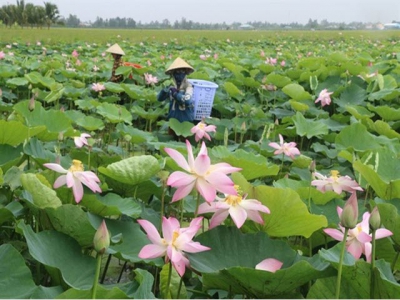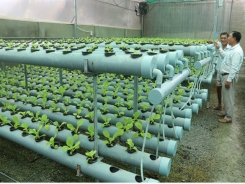Dong Thap rice farmers switch to other crops, incomes rise

Farmers harvest lotus seeds in Dong Thap province’s Thanh Binh district. (Source: VNA)
Dong Thap (VNS/VNA) - Farmers in the Mekong Delta province of Dong Thap have begun to use more than 3,000ha of low-yield rice fields for growing fruits and other crops this year.
They are growing mostly corn, sesame, soybean, sweet potato, lotus, mango, longan, orange and dragon fruit, and their incomes have doubled or even tripled, according to local authorities.
Those growing corn have average yields of 8-12 tonnes per hectare per crop and each time earn 7-10 million VND (300-430 USD) higher than rice.
Provincial authorities have encouraged farmers to use infertile paddies to grow corn and establish concentrated areas for the crop.
The province has zoned such concentrated corn areas in Hong Ngu, Thanh Binh, Tam Nong, Lap Vo and Lai Vung districts.
In the 2018-19 winter-spring crop, the province offered rice farmers a subsidy of 3 million VND (130 USD) per hectare for buying corn seeds for planting if they switched, according to Nguyen Thanh Tai, Deputy Director of the Department of Agriculture and Rural Development.
The province encourages farmers to grow corn varieties that have shorter maturity periods, high quality and consistent yields, including hybrid varieties.
It has also identified high-yield sesame varieties VV12 and VĐ3 as suitable for growing in drought-prone areas in Cao Lanh city and the districts of Cao Lanh, Lap Vo and Tan Hong.
Many farmers rotate rice and sesame on their rice fields, growing rice in winter-spring and summer-autumn and sesame in spring-summer.
The sesame crop helps improve the soil’s fertility and saves water, especially in the dry season. Besides, it earns them more than 30 million VND (1,300 USD) per hectare per crop, 5-10 million VND (215-430 USD) more than summer-autumn rice, according to farmers.
Many rice farmers who have switched to fruits in recent years earn higher incomes since fruits have high value and demand.
Ngo Van Binh, who has turned his 7,000sq.m rice field in Lai Vung district’s Vinh Thoi commune into a red-flesh dragon fruit orchard, said he now earns around 200 million VND (8,620 USD) a year.
“Planting dragon fruit requires high initial investment, but the fruit is easy to grow and has high yields so farmers can recover the investment quickly, while earning good incomes.”
His fruits have a guaranteed buyer in the form of a company, he said.
In Lai Vung, other crops have been grown on more than 2,600ha of rice paddies since 2016, according to the district’s Division of Agriculture and Rural Development.
But the small scale of farming, scattered locations of farms, uneven farming skills and lack of regular outlets are obstacles to restructuring, the division said.
Mai Quoc Hau, head of the division, said: “The district will have detailed plans for converting low-yield rice fields in each area and for their markets.”
The district would work with companies to guarantee outlets for farmers, he promised.
The district also plans to teach farming techniques and provide a subsidy of 60 million VND (2,580 USD) to each cooperative team and cooperative registering for the first time to grow crops to Vietnamese good agricultural practice (VietGAP) standards.
Có thể bạn quan tâm
Phần mềm

Phối trộn thức ăn chăn nuôi

Pha dung dịch thủy canh

Định mức cho tôm ăn

Phối trộn phân bón NPK

Xác định tỷ lệ tôm sống

Chuyển đổi đơn vị phân bón

Xác định công suất sục khí

Chuyển đổi đơn vị tôm

Tính diện tích nhà kính

Tính thể tích ao hồ




 New decree paves way for more rice exporters…
New decree paves way for more rice exporters…  Restructuring helps form agricultural product categories
Restructuring helps form agricultural product categories